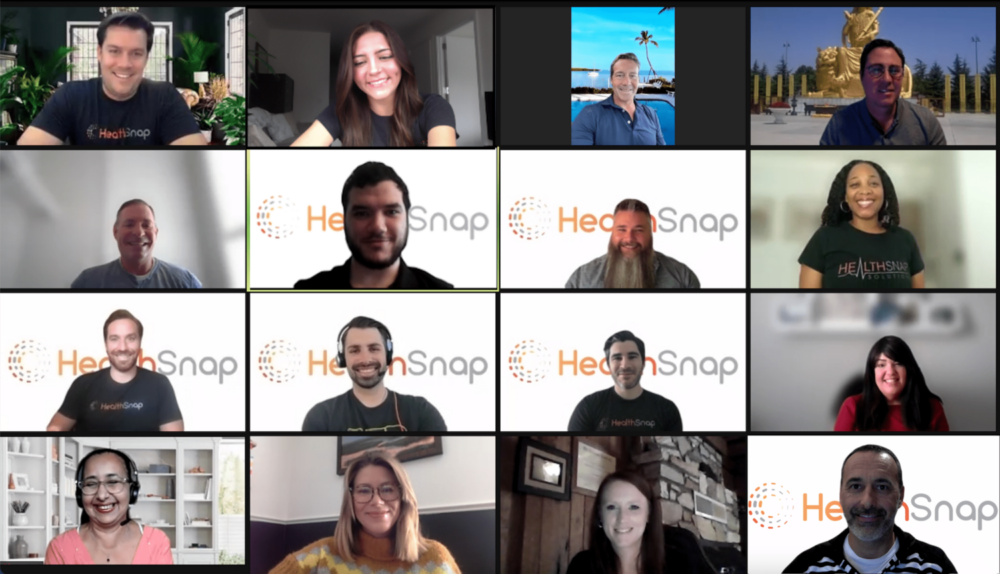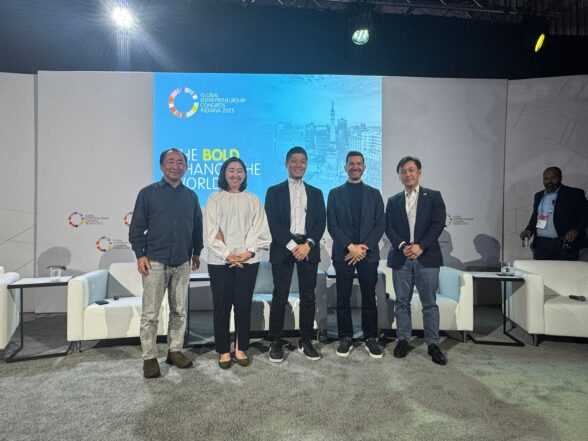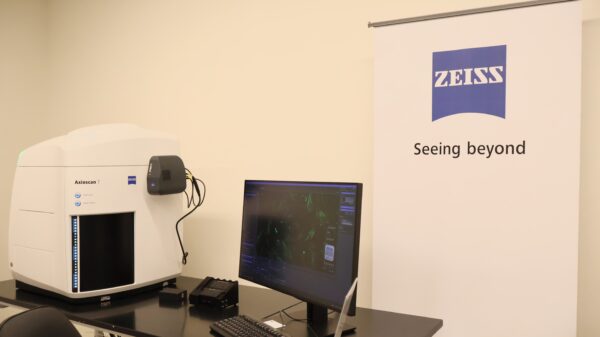CIC’s global community spans three continents and nearly every industry — but one thing our diverse member companies have in common is a burning desire to make an impact. From nonprofits advocating for greater equity in their local communities to biotech startups developing treatments for rare diseases, CIC-based organizations around the world celebrated some serious wins in 2021. Below, we highlight just some of these moments that made us cheer and reminded us why we believe in our work of supporting innovators. Read on to get inspired as we head in 2022.
1. Givebutter
Earlier during this holiday season, people all around the United States participated in #GivingTuesday, a movement to unleash the power of radical generosity, by making charitable contributions to organizations they believe in. Of the donations made on the Tuesday after Thanksgiving, $3M was transacted via Givebutter, a fundraising platform that empowers changemakers to make the world a better (or “butter,” as they delightfully call it) place. With offices at CIC Cambridge, Givebutter has become the top-rated free platform of its kind, and its cofounders (Liran Cohen, Max Friedman, and Ari Krasner, pictured above) were together named to Forbes’ 30 Under 30 in the Social Impact category.
2. OBE Power
As climate change becomes increasingly felt and discussed, there is growing interest in technologies that can help to mitigate its effects. One of these technologies, of course, is the electric vehicle, and this year CIC Miami-based OBE Power helped to make these vehicles more prevalent in their community. In partnership with Miami-Dade County, they launched a public electric vehicle charging program, which equips public parking facilities with smart charging stations. Mayor Daniella Levine Cava credited the project with “[eliminating] one of the barriers that discourage people from transitioning” to battery-powered vehicles by allowing public access to conveniently located and affordable charging stations.
3. Carisma Therapeutics
The quest for better cancer treatments continues, and at the forefront of this innovation is Carisma Therapeutics. A member of CIC Philadelphia, Carisma develops immunotherapies that harness the power of engineered macrophages (for the uninitiated, a macrophage is a type of white blood cell that identifies and digests dangerous cells in the body). In January, the company announced a $47M Series B, brought up to $59M with a second closing in March. Around the same time, the first in-human study of Carisma’s CAR-Macrophage technology began at the University of Pennsylvania. Meanwhile, Carisma engaged in several collaborations in 2021, including with Dr. Bruce Blazar and Merck.
4. Vysioneer
In Cambridge, another CICer tackles cancer from a different angle. That company is Vysioneer, a global leader in utilizing artificial intelligence (AI) towards cancer care. In April, Vysioneer announced that it received FDA clearance for its tumor auto-contouring solution in radiation therapy, the first technology of its kind. Powered by a deep learning algorithm, the AI tool, known as VBrain, serves as a “second set of eyes and hands for clinicians,” as Vysioneer describes it. This allows for greater precision in cancer treatment and therapy follow-up examinations, and facilitates tumor response assessment in clinical trials.
She Matters founder Christina Moreno makes her partnership with Nike official at CIC Rotterdam. (Photo courtesy of She Matters.)
5. She Matters
Nike said to “just do it,” and that’s exactly what She Matters did in 2021. Residing at CIC Rotterdam, She Matters empowers companies and international talent on both sides of the hiring process with recruitment support and career readiness training. In May, the organization announced it was partnering with Nike to grow its Lotus Flower Programme, a nine-week program aimed at preparing women of refugee and migrant backgrounds to successfully enter the Dutch labor market through upskilling, mentorship, and employment opportunities. The impacts of She Matters’ approach have been felt already as alumni have gone on to land roles at major companies. Kudos to Lula and Marwa on joining Patagonia!
6. Housing Navigator
In 2021, Boston again ranked as one of the most expensive cities in the US (after San Francisco and New York) as the entire state of Massachusetts experiences a housing crisis marked by soaring costs and high demand. In response, Housing Navigator Massachusetts released a free online tool this summer that simplifies the search for affordable rentals. Since launching, the site has brought in more than 24,000 visitors from across Massachusetts, many of them from communities impacted by racial and economic inequality. Strong adoption by older adults (11% of users are ages 65+) has been another sign of success to the Housing Navigator team, which works out of AGENCY, a community at CIC Cambridge dedicated to technologies that support healthy aging. Just this month, the Commonwealth of Massachusetts announced its intention to require all new state-funded housing to be listed on Housing Navigator, increasing access and transparency around affordable housing availability.
7. HealthSnap
In an increasingly digitized world, telehealth is the wave of the future, and thanks to a certain global pandemic, the future has very much arrived. One of the companies working to make this remote care world a healthier one is HealthSnap, based out of CIC Miami. An integrated Virtual Care Platform, HealthSnap enables remote chronic condition management for improved patient outcomes, as well as ease of use and diversified revenue streams for providers. In January, the company announced a $4M funding round, followed by another $5M round in November that will go towards expanding its clinical services and R&D for expanded clinical use cases.
8. Dream Builders 4 Equity
What’s in a name? Everything, if you’re Dream Builders 4 Equity. The St. Louis-based CICer focuses on community development through growing equity for youth, business, residents, and real estate. In 2021, its locally-rooted commitment to economic sustainability and social engagement led to multiple big ticket contributions, including a five-year, $1M grant through the Little Pebble Foundation and $100K in grants from the Regions Foundation to support homeownership. Meanwhile, DB4E cofounder Neal Richardson was nominated in June by Mayor Tishaura Jones to take over as Executive Director of the St. Louis Development Corporation, the economic development arm of the City of St. Louis. As 2021 winds down, the DB4E team is hard at work raising funds for #HydePark2025, a large-scale project to employ local youth and BIPOC contractors in rehabbing properties and building community resources in the Hyde Park neighborhood.
9. Sagenso
From phishing scams to data leaks, cyber attacks are increasingly common nowadays. Coupled with the rise of remote work, demand for data protection is growing. That’s where CIC Warsaw member Sagenso comes in. The company takes a comprehensive approach to building up organizational defenses to these vulnerabilities. Their CyberStudio platform acts like a virtual IT security consultant, employing automation features, constant analysis, and AI algorithms to monitor and manage companies’ cybersecurity. In 2021, Sagenso received a notable vote of confidence in the form of $500K in venture funding from Satus Starter.
10. GiftAMeal
Every day, countless photos of food are shared on social media; meanwhile, over 40 million people in the US don’t know where their next meal will come from. The bridge between this gap is called GiftAMeal, a socially conscious dining app that provides a meal to someone in need for each meal photo taken at a partner restaurant. In 2021, the CIC St. Louis-based GiftAMeal reached 800K free meals provided through partnerships with 290 restaurants. Interestingly, a case study published by the organization showed that customers using the app, on average, spend 11% more per check, return 51% more frequently, and tip 49% more than other customers. Establishing itself as a growing force for good, the GiftAMeal team landed $500K in funding in June, including a $100K Growth Grant from Arch Grants. The founder and CEO behind this meal-for-meal model, Andrew Glantz, was named to Forbes’ Next 1000.
11. Nuvalent
The funding wins kept coming for Nuvalent this year. Founded in 2017, the biotech startup launched publicly in January when it announced a $50M Series A round from Deerfield Management. Another announcement came in May, this time a $135M Series B led by Bain Capital Life Sciences. By late July, Nuvalent debuted on the Nasdaq stock exchange with a $191M upsized IPO. Founded by Harvard chemist and professor Dr. Matthew Shair, the CIC Cambridge member company harnesses its deep expertise in structure-based drug design to develop precisely targeted therapies that have the potential to overcome treatment resistance, drive more durable responses, and minimize adverse events. With multiple novel drug candidates in the pipeline, Nuvalent’s vision is to grow into a fully-integrated biotech that can discover, develop, and deliver new medicines for patients with cancer.
12. MuzicSwipe
The award for the “most 2021” way to stumble upon new music and artists goes to MuzicSwipe, which makes a physical home for itself at CIC Miami. Bridging the gap between artists and music lovers, MuzicSwipe is a music discovery app, platform, and community focused on rising artists and helping new fans to discover them. “It’s like Pandora meets Tinder,” writes Julia Stier on Medium. The app is available for pre-order with its beta launching January 2022. With an emphasis on relationship-building, the company attracted mass attention in 2021 by throwing several events in Miami, Nashville, and Los Angeles, gaining 10k followers before pre-order. MuzicSwipe is setting out to spotlight rising artists while working together with influencers to create unique and unmatched experiences for fans, covered in media outlets such as Yahoo! Finance, EXTRA TV, E! Online, Access Hollywood, Getty Images, and more.
13. Century Therapeutics
From the labs of CIC Philadelphia comes cutting-edge cell therapy innovation: Century Therapeutics harnesses the unlimited, self-renewing potential of iPSCs, a type of stem cell, to create more effective off-the-shelf cell therapies for cancer. The biotech company closed a $160M Series C in March, and in June announced a $242.7M IPO. Also this year, Century entered into a research collaboration agreement with Outpace Bio to explore Outpace’s protein design capabilities for cell therapy to potentially enhance the functionality of Century’s iPSC platform. With four products in the pipeline, Century is poised for a big 2022; the company’s lead candidate, a cell therapy for B-cell malignancies, is on track for its IND (investigational new drug) filing by mid-2022.
14. MeetCaregivers
Intelligently connecting and matching seniors with caregivers through its digital marketplace, CIC Cambridge member MeetCaregivers, Inc. raised over $1M in funding in April. The company will use the funds to improve its care portal, scale operations in New England, penetrate new markets, and enable millions of seniors to age happily at home. In addition, this year the team also partnered with CIC Health to facilitate COVID-19 testing across 300+ public schools in Massachusetts and other states.
Warsaw-based Dronehub’s “drone-in-a-box” solution. (Photo courtesy of Dronehub.)
15. Dronehub
“Drone-in-a-box” provider Dronehub has been on the up and up in 2021. The Warsaw-based CICer, which automatizes drone operations primarily for the energy, railway, and security sectors, received $1.9M from Poland’s National Center for Research and Development. In April, Dronehub reported a new partnership with tech giant IBM, whose AI solutions will enable the startup to expand its algorithmic capabilities and develop applications for more industries. Dronehub has also been tasked with carrying out test flights for the multinational Uspace4UAM project; the first test flight took off in November. With these milestones and more under the team’s belt in 2021, it’s no surprise that founder Vadym Melynk made it into Forbes’ 30 Under 30 in Poland.
Companies like these could be your new neighbors! Schedule a free tour of our spaces and community to see how CIC can help you work better:








